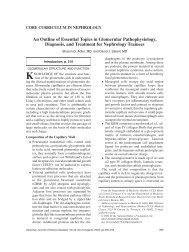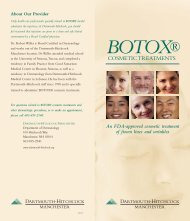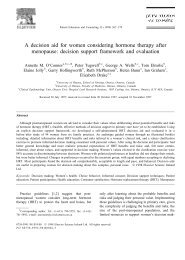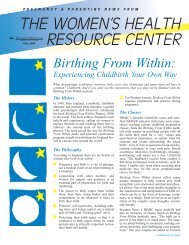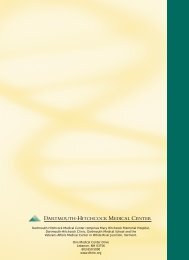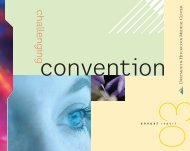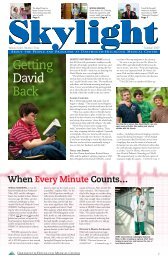Surgery and Healing in the Developing World - Dartmouth-Hitchcock
Surgery and Healing in the Developing World - Dartmouth-Hitchcock
Surgery and Healing in the Developing World - Dartmouth-Hitchcock
You also want an ePaper? Increase the reach of your titles
YUMPU automatically turns print PDFs into web optimized ePapers that Google loves.
International Surgical Education<br />
Such a surgical milieu can be ma<strong>in</strong>ta<strong>in</strong>ed regardless of government <strong>in</strong>terference.<br />
However, access to <strong>the</strong> best technology <strong>and</strong> <strong>the</strong> highest economic return for <strong>in</strong>dividuals<br />
may take a buffet<strong>in</strong>g before <strong>the</strong> former equilibrium is restored. It is possible<br />
that we will f<strong>in</strong>d ourselves on unsettled seas for some time to come, but that should<br />
not deter us from tak<strong>in</strong>g responsibility for <strong>the</strong> transfer of our surgical DNA to <strong>the</strong><br />
next generation of surgeons.<br />
Manag<strong>in</strong>g Change<br />
Ma<strong>in</strong>ta<strong>in</strong><strong>in</strong>g st<strong>and</strong>ards <strong>in</strong> an era of change requires flexibility, with a primary<br />
commitment to servic<strong>in</strong>g <strong>the</strong> health care needs of <strong>the</strong> patient, without compromis<strong>in</strong>g<br />
<strong>the</strong> quality of care now rendered <strong>and</strong> <strong>the</strong> progress that might yet be possible <strong>in</strong><br />
develop<strong>in</strong>g fur<strong>the</strong>r surgical skills for treat<strong>in</strong>g <strong>and</strong> prevent<strong>in</strong>g disease. The developed<br />
world has a lot to learn from <strong>the</strong> develop<strong>in</strong>g nations on how surgical leadership can<br />
adapt <strong>and</strong> make up <strong>in</strong> imag<strong>in</strong>ative resourcefulness what it lacks <strong>in</strong> economic support<br />
or public commitment. People all around <strong>the</strong> world look to surgeons’ skills for help<br />
when <strong>the</strong>y have a problem, yet do not want to divert a high percentage of resources<br />
to susta<strong>in</strong><strong>in</strong>g or advanc<strong>in</strong>g <strong>the</strong> surgical art through public commitment to education<br />
<strong>and</strong> research.<br />
It was suggested by some <strong>in</strong> <strong>the</strong> discussion follow<strong>in</strong>g each presentation <strong>in</strong> this<br />
program that <strong>the</strong> large population dem<strong>and</strong>s of Africa represent a call for down-scale<br />
commitment of <strong>the</strong> resources that cannot be matched <strong>in</strong> <strong>the</strong> technology-<strong>in</strong>tensive<br />
tertiary health care centers of <strong>the</strong> developed world; that, perhaps, primary emphasis<br />
should be on basic health care, with centers of excellence such as those described <strong>in</strong><br />
South America serv<strong>in</strong>g as role models. Ano<strong>the</strong>r suggestion was made that Australia<br />
might represent some model of what future American surgeons could expect from<br />
<strong>the</strong> conflict between ris<strong>in</strong>g dem<strong>and</strong> <strong>and</strong> dim<strong>in</strong>ish<strong>in</strong>g resources, with government<br />
<strong>in</strong>terest <strong>in</strong> controll<strong>in</strong>g public use of surgical services.<br />
Despite widely different educational systems <strong>and</strong> competitive pressures <strong>in</strong> <strong>the</strong><br />
entry <strong>and</strong> development of surgical career patterns, <strong>the</strong> products of <strong>the</strong>se various<br />
systems on several cont<strong>in</strong>ents have remarkable similarity regard<strong>in</strong>g <strong>the</strong>ir stated goals<br />
<strong>and</strong> objectives: with whatever resources, facilities, technology, <strong>and</strong> manpower <strong>the</strong><br />
system affords, <strong>the</strong> highest quality of competent <strong>and</strong> compassionate surgical skill<br />
should be delivered; <strong>and</strong> surgeons should be taught to address <strong>the</strong> patient’s problem,<br />
which rema<strong>in</strong>s <strong>the</strong> s<strong>in</strong>gle focus of surgical attention <strong>in</strong> a wide variety of geographic,<br />
disease pattern, economic, <strong>and</strong> educational system sett<strong>in</strong>gs.<br />
At this juncture <strong>in</strong> history <strong>the</strong>re is a good deal of enthusiasm for <strong>the</strong> concept of<br />
“Internationalism <strong>in</strong> Surgical Education.” This is possible now more than ever before.<br />
The language of modernity, technology, <strong>and</strong> particularly medic<strong>in</strong>e is English,<br />
so <strong>the</strong>re are fewer barriers to communication of <strong>the</strong> heal<strong>in</strong>g arts. There is a common<br />
literature <strong>and</strong> even more rapid media to which nearly all professionals make reference.<br />
This universalization of <strong>the</strong> st<strong>and</strong>ards of excellence means that nearly all people<br />
can appeal for <strong>the</strong> best possible quality where it means <strong>the</strong> most for <strong>the</strong>m—<strong>in</strong> matters<br />
of life or death, <strong>and</strong> <strong>in</strong> <strong>the</strong> quality of <strong>the</strong>ir daily lives. The heal<strong>in</strong>g art is a nearly<br />
ideal transportable skill across artificial barriers among humans. If we recognize <strong>the</strong><br />
real problems that isolate people naturally, such as disease, hunger, <strong>and</strong> want, we<br />
may be able to build bridges around political, economic, <strong>and</strong> religious systems that<br />
impose artificial barriers on people <strong>in</strong>habit<strong>in</strong>g this crowded planet. We have many<br />
neighbors we haven’t yet met; <strong>the</strong>y have heard of us, however, <strong>and</strong> what <strong>the</strong>y know<br />
23<br />
4



